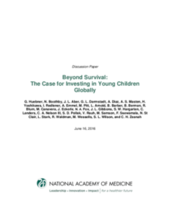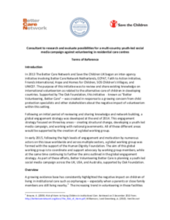This page contains documents and other resources related to children's care in the Americas. Browse resources by region, country, or category.
Displaying 2551 - 2560 of 3191
In the article, the author argues that more openness in foster care arrangements is beneficial to children’s wellbeing as well as to their foster and biological families.
This article highlights effective approaches to staying connected with (i.e., recruiting, relocating, and retaining) youth participants who have transitioned out of foster care in longitudinal research studies.
This study describes natural mentoring among preadolescent children placed in out-of-home care and examines the association between natural mentoring and demographic, maltreatment, placement, and psychosocial characteristics.
This six-part video series from the BBC highlights the discrimination and challenges that poor women of color face in the child welfare system in New York City.
This paper from the U.S. National Academy of Medicine argues the importance of investment in early childhood development and serves as a call to action “to close the gap between what is known and what is done to support the development of children globally and, in turn, sustainable progress for communities and nations.”
This paper reports on a research capacity building initiative designed to address the lack of research and evidence on the efficacy of child welfare services in Canada.
A new US federal rule, to be enacted this December, will require judges presiding over foster and adoption proceedings in every state in the country to ask about the child’s status as a tribal member, according the article.
This editorial from the Toronto Star highlights the racial disproportionality in Toronto’s child welfare system and in child welfare systems across Canada.
This consultancy project consists of a 3 month period to further research and develop plans for a youth-led media campaign in the UK, USA, and Australia.
This study investigated the widely-used but under-researched program for training resource parents (i.e., foster, adoptive, or kinship parents) known as preservice PRIDE (Parent Resources for Information, Development and Education). The sample consisted of 174 participants in Ontario, Canada.



